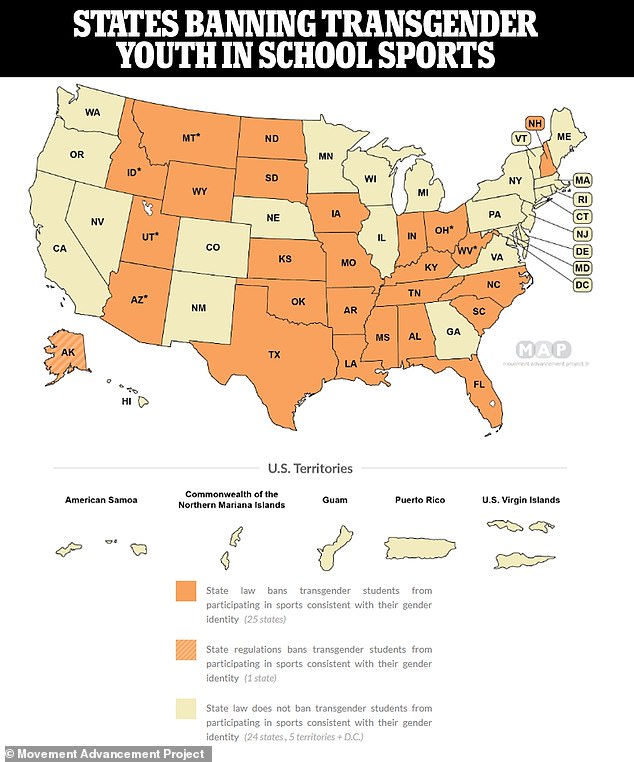There has been a worldwide controversy over Imane Khelif, a “biologically male” athlete who competed in women’s boxing against her opponent Angela Carini at this week’s Olympics.
But the issue of athletes competing in sports that do not correspond to their biological sex is not new, and has been a hot topic for years in the United States.
Since 2020, half of US states have implemented various bans to prevent transgender youth from competing in girls’ school sports.
Almost all of them are led by Republicans, highlighting the politically sensitive nature of the issue.
The map above shows states that have banned transgender youth participation in sports, mostly in the southern and central US.
Khelif, who was born female but tested positive for XY chromosomes (normally seen in men), defeated Carini in just 46 seconds into the match, with her opponent pulling out saying she feared for her safety.
There has since been a backlash online, with many figures, including Harry Potter author JK Rowling, suggesting that Khelif should not have been allowed to compete in the women’s category.
Before the match, high school volleyball player Payton McNabb, who was left partially paralyzed after a transgender player hit her with a ball, said it was “disgusting” that Khelif was allowed to compete.
Since her injury, the North Carolina native has been instrumental in implementing a ban in her state that prevents biological males from competing in women’s sports.
She has urged other states to follow suit, arguing that allowing trans women to participate in women’s sports could be dangerous and deprive biological women of the opportunity to play.
Several reviews have suggested that biological males retain an advantage over their female athlete peers, even years after beginning their transition and taking testosterone-lowering hormones.
This is the evidence that several states have used in proposing bans on transgender athletes in women’s sports.
The bans mean transgender children are prevented from playing on teams that match their gender identity, but not their biological sex.
Transgender youth make up about one percent of students ages 12 to 17 in schools.
Of the states that will implement bans, 11 say a child’s sex will be defined by the sex listed on his or her birth certificate.
Oklahoma requires an affidavit (or written statement sworn to be true) about the child’s sex on his or her birth certificate, while other states give details of a biological male in their bans.
A map compiled by the Movement Advancement Project, a think tank that advocates for trans rights in the states, shows that the 25 states that have introduced bans are concentrated in the southeastern and western United States, and nearly all are led by Republicans.
These include the Dakotas, Texas, Iowa, Missouri, Utah, Montana, Florida, Kentucky, Alabama, and Louisiana, among others.
The Movement Advancement Project calls these policies “blanket bans on transgender participation in sports, and these bans are unnecessary and harmful.”
It is also in these states where lawmakers have limited or are attempting to limit the options available to people who identify as trans, including restricting hormone therapy, puberty blockers, and bathroom access.
States that allow trans youth to participate in sports that align with their gender identity include California, Colorado, New Mexico, New York, Georgia, Minnesota and Illinois, among others.
Unlike their counterparts, these states mostly have protections for people who identify as trans, including bathroom choice, workplace and school protections, and access to hormone replacement therapy and puberty blockers.

